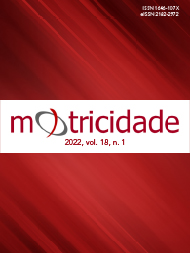Autonomous fundamental motor skills in the school environment: a cross-sectional study
DOI:
https://doi.org/10.6063/motricidade.24245Keywords:
Autonomous fundamental motor skills, Motor development, School, Physical educationAbstract
Autonomous fundamental motor skills (AFMS) are understood as movements practiced in a spontaneous, voluntary manner, without any instruction or command. The aim of the study was to compare the frequency of occurrence and the quality of performance of AFMS in children during recess and Physical Education (PE) classes. Elementary school students (n=148) from a private school were observed during recess and PE classes and had their AFMS classified by stages (initial; elementary-emergent; proficient). All AFMS were identified in recess and PE classes, except jump. Most skills were classified in the elementary-emergent stage and were slightly more frequent during PE classes, both in the locomotor (27% vs 23%) and manipulative (31% vs 13%) categories. The frequency of occurrence of AFMS was low and the classification showed poor quality at all times observed. Recess was statistically (p < 0.05) less favourable for motor development in 60% of AFMS. The low frequency of AFMS, especially during recess, and poor classification of motor repertoire suggest the need for measures to reverse the motor deficit in the school environment. Strategies are needed to promote AFMS in the school context so that they are more diverse and challenging.
Keywords: Autonomous fundamental motor skills, Motor development, School, Physical education.
Downloads
Additional Files
Published
Issue
Section
License
The authors of submitted manuscripts must transfer the full copyright to Journal Motricidade / Desafio Singular Editions. Granting copyright permission allows the publication and dissemination of the article in printed or electronic formats and copyrights start at the moment the manuscript is accepted for publication. It also allows Journal Motricidade to use and commercialize the article in terms of licensing, lending or selling its content to indexation/abstracts databases and other entities.
According to the terms of the Creative Commons licence, authors may reproduce a reasonable number of copies for personal or professional purpose but without any economic gains. SHERPA/RoMEO allows authors to post a final digital copy (post-printing version) of the article in their websites or on their institutions' scientific repository.


